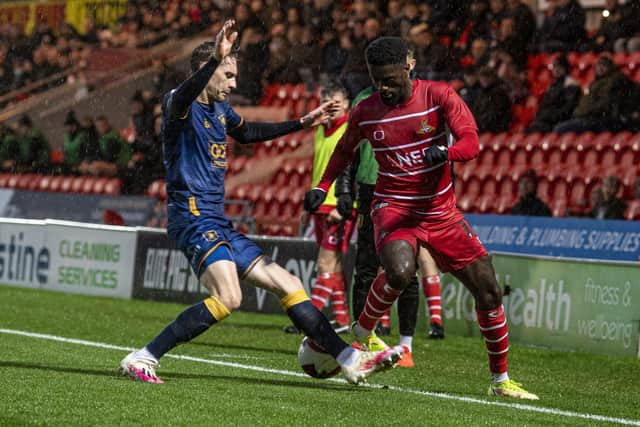Doncaster Rovers: Patience, and money, were in short supply for Richie Wellens


It was another reminder why, despite the Premier League backlash to Tracey Crouch’s fan-led review, a better redistribution of English football’s huge wealth is vital.
There is an argument for saying League One is less influenced by money than most, with stable, well-run clubs led by Rotherham United outperforming richer, more glamorous rivals but when Wellens looks back on a 27-game tenure featuring just six wins, he is bound to wonder what might have been with a bit more cash.
Advertisement
Hide AdAdvertisement
Hide AdThe 41-year-old went into his fourth lower-league management job knowing his budget was lycra-tight but believed he would get patience at the Keepmoat Stadium. It ran out last week.


The League One table, with Doncaster mired in its relegation zone all season, showed he did not have enough to make the most of his poor hand.
His bad luck started with a Covid-disrupted pre-season and Sod’s Law dictated injuries bit hard into a small squad. At times Tom Anderson felt like the old-stager in a village cricket fourth team of teenagers, so light were Rovers on experience. He is only 28.
Wellens handicapped himself by refusing to select Omar Bogle or Ed Williams when he could not move them on. August’s deadline-night scramble was an embarrassing failure.
Advertisement
Hide AdAdvertisement
Hide AdOften when a new manager arrives a club finds money down the back of the sofa for the next transfer window, as Neil Warnock fully expects for Chris Wilder at Middlesbrough, but at Doncaster it is not there, and to throw money they do not have at a problem would be unwise.
So whilst we can argue Wellens could and should have done this or that better, speculate how things might have been different with more luck and point out money is not the be-all and end-all, there was an inevitability to Doncaster’s struggle. Clubs can fight the financial odds, but only so long.
Money is making football more predictable by the season, which is why Leeds United chief executive Angus Kinnear missed the point with his “Maoist” rant about Crouch’s report.
“I believe in competition, unfettered by government control and undistorted by non-merit based hand-outs, is the heart of a flourishing professional pyramid that inspires and funds flourishing grassroots,” he wrote.
Competition?
Advertisement
Hide AdAdvertisement
Hide AdLeeds are in their second season back in the top-flight. The last time we could say that, they won it; this time, their chances were virtually zero. Arguably only four teams – Liverpool, Chelsea and the Manchester two – started with realistic title hopes and inept management soon ended Manchester United’s.
And the Premier League is more competitive than most.
Bayern Munich are going to win their 10th consecutive Bundesliga, and Paris Saint-Germain their eighth of 10 Ligue 1s. Last season Inter Milan broke a run of nine straight Serie As for Juventus, matching what Rangers did in Scotland to Celtic.
All four English teams qualified for the Champions League knockout stages before the final group games. Borussia Dortmund were the only side from the “big five” leagues who had been knocked out, so sacked their manager. The last four finals have featured five English teams, destroying the argument they need to hang onto as much booty as possible to compete with the big hitters.
You might reasonably think the 15 per cent of revenue the Premier League trickles down the pyramid was plenty if you did not see the reality at the “flourishing grassroots” Kinear wrote about. His instincts to oppose “non-merit based hand-outs” are laudable, and he is right it would be better if the Football League negotiated a better television deal to bridge the yawning financial gap to the top division but if no one is willing to pay more - certainly not as much as is needed - little can be done.
Advertisement
Hide AdAdvertisement
Hide AdWhatever the theory, the system is not working. The best teams in each European league qualify for the Champions League – even, in the big leagues, in rare seasons they do not win it – and earn riches their domestic rivals can only dream of, letting them pick off their best players, topped up by imports, to continue the cycle. Fulham and Bournemouth will be promoted from the Championship this season, helped by parachute payments whose value has been inflated by the pandemic.
Of all world football’s problems, lack of money is not one yet 62 of England and Wales’s 92 clubs have been in administration since the Premier League began. Its clubs are £4bn in debt, yet still lecture those below. Championship clubs lost £434m in 2019-20, pushing debt up to £1.3bn.
The Premier League has been very vocal in opposing Crouch’s attempt to share money better. That means it must be a good idea.
Comment Guidelines
National World encourages reader discussion on our stories. User feedback, insights and back-and-forth exchanges add a rich layer of context to reporting. Please review our Community Guidelines before commenting.